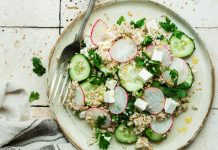
High blood pressure, or hypertension, is a common condition that significantly increases the risk of heart disease and stroke, two of the leading causes of death worldwide.
Diet plays a crucial role in the management and prevention of high blood pressure, and one of the most effective nutritional strategies developed is the Dietary Approaches to Stop Hypertension (DASH) diet.
This review explores how the DASH diet helps manage blood pressure and the evidence supporting its effectiveness, all explained in straightforward language for easy understanding.
What is the DASH Diet?
The DASH diet is a lifelong approach to healthy eating designed to help treat or prevent high blood pressure. It emphasizes foods that are low in sodium but rich in potassium, calcium, and magnesium, which are key nutrients in helping to lower blood pressure.
The diet encourages the consumption of fruits, vegetables, whole grains, and lean proteins such as fish and poultry, and includes some nuts, seeds, and legumes. It also limits foods high in saturated fat, such as fatty meats and full-fat dairy products, and restricts sugary beverages and sweets.
Evidence of Effectiveness
Since its development in the early 1990s by researchers sponsored by the U.S. National Institutes of Health, numerous studies have validated the DASH diet’s effectiveness in lowering blood pressure.
In one of the pivotal studies, individuals who followed the DASH diet saw a significant reduction in their systolic and diastolic blood pressure in as little as two weeks compared to those consuming a typical American diet.
Further research has consistently shown that the DASH diet can reduce blood pressure to a similar extent as medications in some individuals, especially when combined with a low sodium intake.
A systematic review published in the journal Hypertension analyzed multiple studies and confirmed that the DASH diet significantly reduces blood pressure across a diverse range of age groups and demographic backgrounds.
Benefits Beyond Blood Pressure
The benefits of the DASH diet extend beyond just lowering blood pressure. Research has shown that it can also help reduce cholesterol levels and may lower the risk of several types of cancer, heart disease, stroke, heart failure, and kidney stones.
It is also beneficial in preventing diabetes and aiding in weight loss when combined with calorie restriction.
Implementing the DASH Diet
Adopting the DASH diet involves a few key changes in eating habits:
- Increase Fruit and Vegetable Intake: Aim for 4 to 5 servings of fruit and 4 to 5 servings of vegetables per day.
- Choose Whole Grains: Swap refined grains for whole grains like whole wheat, brown rice, and quinoa. Aim for 6 to 8 servings per day.
- Incorporate Lean Proteins: Include more fish, poultry, and legumes. Red meat should be limited, and fish should be on the menu twice a week.
- Add Dairy: Opt for low-fat or non-fat dairy products to get your calcium without high fat intake.
- Reduce Sodium: Lower sodium intake to less than 2,300 milligrams a day (about 1 teaspoon of salt). Going even lower, to 1,500 milligrams, can be more beneficial for lowering blood pressure.
- Control Portions and Sweets: Keep sweets and added sugars to a minimum and watch portion sizes.
Conclusion
The DASH diet is more than just a dietary pattern; it’s a proven strategy for improving health, particularly for those managing or at risk for high blood pressure.
By emphasizing nutritious foods and limiting salt, sugar, and unhealthy fats, it offers a balanced approach to eating that can lead to lasting health benefits.
Whether you are trying to lower your blood pressure, reduce your risk of heart disease, or simply lead a healthier lifestyle, the DASH diet provides a sound, evidence-based framework to guide your food choices.
If you care about high blood pressure, please read studies about potatoes and high blood pressure, and top 10 choices for a blood pressure-friendly diet
For more information about high blood pressure, please see recent studies about impact of vitamins on high blood pressure you need to know, and the powerful link between high blood pressure and a potassium-rich diet.
Copyright © 2024 Knowridge Science Report. All rights reserved.



